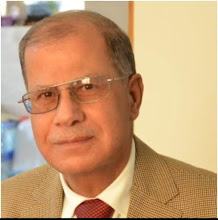The Invisible Perfidy
in
in
Waiting for Godot
By
Abdul-Settar Abdul-Latif
By
Abdul-Settar Abdul-Latif
English Department, College of Education, University of Basrah/Iraq
Email: ibnassad2005@yahoo.com
ABSTRACT
The study contends that the theme of perfidy lies deep into the tissues of Beckett's Waiting for Godot. In addition, it detects that a scheme of treason trumped up by Vladimir to bring his friend Estragon to gallows, is not only invisible, unstaged and unuttered but also unfathomed before. The study explores this theme amid palls of obscurity, invisibility and silence hooding the play. Despite such difficulties, it finds five mechanisms of its own to attack the topic. The first is somehow a stylistically oriented criticism. It compares the two appearances of Godot's Messenger in the two acts together focusing on the use of pronouns (I, We and You) used in the 2nd meeting in particular. The pronouns are checked in compliance with the Forms of Motionlessness (Silences, Pauses etc) as well as with Vladimir's five surnames. The other four are categorized as follows: (1) Thematic Evidences, (2) Verbal Allusions, (3) Patterns of Duality, (4) and Kinetic Evidences. They submit relevant textual data to analysis and interpretation. The significance of the study lies in the following:
1. The study probes into the theme of perfidy in WFG that has been totally unfathomed before. It would help to read the play in general and understand the relationship between Didi and Gogo in particular in a new perspective.
2. The study finds out that the play incorporates some autobiographical touches that are behind sounding of the invisible treason in WFG. Such touches are to refute the view that the play is invulnerable to impersonation.
3. The play only on the invisible level grows in both action and conflict. Its action and conflict denied so far by Beckettian studies run in parallel with the invisible perfidy in question.
4. In addition to the known techniques of the Absurd Drama, the study explores a new one used by Beckett in Waiting for Godot, i.e. the Silencing of (the Stream of) Consciousness.
The study contends that the theme of perfidy lies deep into the tissues of Beckett's Waiting for Godot. In addition, it detects that a scheme of treason trumped up by Vladimir to bring his friend Estragon to gallows, is not only invisible, unstaged and unuttered but also unfathomed before. The study explores this theme amid palls of obscurity, invisibility and silence hooding the play. Despite such difficulties, it finds five mechanisms of its own to attack the topic. The first is somehow a stylistically oriented criticism. It compares the two appearances of Godot's Messenger in the two acts together focusing on the use of pronouns (I, We and You) used in the 2nd meeting in particular. The pronouns are checked in compliance with the Forms of Motionlessness (Silences, Pauses etc) as well as with Vladimir's five surnames. The other four are categorized as follows: (1) Thematic Evidences, (2) Verbal Allusions, (3) Patterns of Duality, (4) and Kinetic Evidences. They submit relevant textual data to analysis and interpretation. The significance of the study lies in the following:
1. The study probes into the theme of perfidy in WFG that has been totally unfathomed before. It would help to read the play in general and understand the relationship between Didi and Gogo in particular in a new perspective.
2. The study finds out that the play incorporates some autobiographical touches that are behind sounding of the invisible treason in WFG. Such touches are to refute the view that the play is invulnerable to impersonation.
3. The play only on the invisible level grows in both action and conflict. Its action and conflict denied so far by Beckettian studies run in parallel with the invisible perfidy in question.
4. In addition to the known techniques of the Absurd Drama, the study explores a new one used by Beckett in Waiting for Godot, i.e. the Silencing of (the Stream of) Consciousness.
TO DOWNLOAD, PRESS THE INVISIBLE PERFIDY

No comments:
Post a Comment